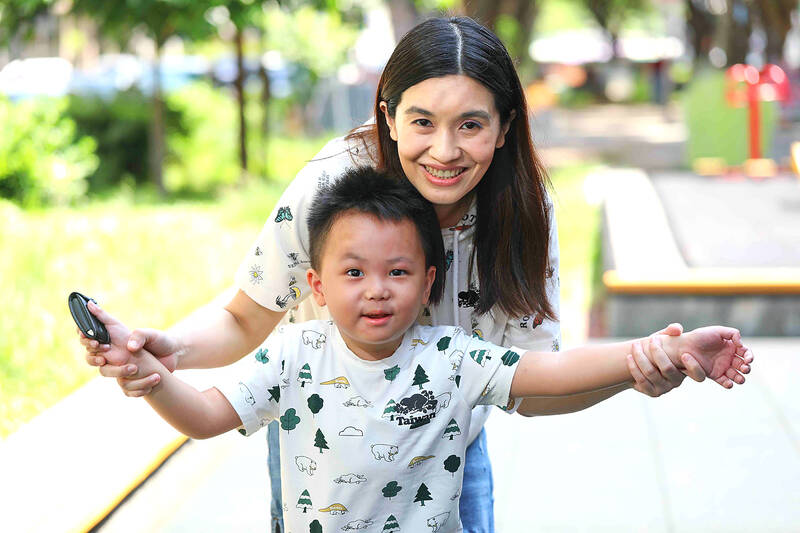The adoption of a young boy with special needs by his former doctor has gone viral in the nation, highlighting the issue that prospective adoptive children with special needs find it difficult to find families willing to adopt them.
Wang Xing-an (王杏安), a doctor, recently adopted a six-year-old boy with multiple diseases, who was given the nickname Chai-chai (柴柴).
In Taiwan, more than 80 percent of prospective adoptive children and teenagers have special needs, but most waiting families only want children without disabilities, a social worker said.

Photo: Tsai Shu-yuan, Taipei Times
However, there was an average annual increase of 274 children and teenagers waiting for a home from 2021 to last year, but only about 25 percent of adoption matches were successful, data from the Ministry of Health and Welfare’s Social and Family Affairs Administration showed.
In Taiwan, 408 children are looking for an adoptive family, and more than 80 percent of them have diseases, physical or mental disabilities, developmental disability or special family backgrounds, said a hospital social worker, surnamed Chang (張), who assisted Wang in adopting Chai-chai.
Expectant adoptive families, either in Taiwan or abroad, do not want to adopt children with diseases or disabilities, she said.
Children who are not adopted by a family end up in adoptive institutions or nursing homes and become bedridden due to insufficient medical treatment and care, she said.
Those who have severe epilepsy might even go into a vegetative state, she added.
Chai-chai was born into a high-risk family and sent to hospital in a coma due to an electrolyte imbalance 17 days after birth.
He was diagnosed with a rare disease called tuberous sclerosis complex, which causes severe epilepsy and numerous noncancerous tumors in many parts of his body.
Chai-chai was hospitalized in time and received special medication when he was just two months old — the youngest person in Taiwan to be on that medication, Chang said.
Before adopting Chai-chai, Wang was providing him with educational and rehabilitative support.
As his attending physician, she conducted early childhood intervention and cared for the boy along with babysitters from the Taichung City Government’s Department of Social Welfare.
She continued to foster Chai-chai, including bringing him to preschool when he was two years old, and providing him with medical care when he was later diagnosed with brain atrophy, solitary kidney and severe vesicoureteral reflux.
Chai-chai was hospitalized 23 times in the following three years and developed a serious kidney abscess and sepsis before he had ureteral reconstruction surgery and recovered.
Wang also took Chai-chai to meet her family and travel abroad. Her parents said they were deeply moved by their daughter’s love for the boy, and helped to look after him.
She gave up marrying her boyfriend, as he could not accept Chai-chai as part of their family, although they have a daughter and twin boys.
It was hard for Wang, being a single parent with three children, to adopt another child, let alone one with special needs such as Chai-chai, Garden of Hope Foundation supervisor Lin Jung (林容) said.
However, Wang impressed the adoption review committee when she refused the committee’s proposal to maintain the “quasi-adoptive relationship,” meaning that she would care for Chai-chai while the government would bear the financial burden, she said.
“The child [Chai-chai] is my child. We are inseparable. All I need is for the country to make me the legal mother for the boy,” Lin quoted Wang as saying to the committee.
Wang has medical expertise, and her dutiful attitude toward adopting and caring for Chai-chai along with her parents was the key to the successful adoption application, she said.
Wang’s application for her adoption of Chai-chai was approved by the court in June after an adoption evaluation process that included investigation, home visits, assessments and a pre-adoption trial, which lasted for more than three years.
“It never occurred to me that the baby boy relentlessly crying in the incubator would become my eldest son,” she said.

Actor Darren Wang (王大陸) was questioned by prosecutors for allegedly orchestrating an attack on a taxi driver after he was allegedly driven on a longer than necessary route in a car he disliked. The questioning at the New Taipei City District Prosecutors’ Office was ongoing as of press time last night. Police have recommended charges of attempted murder. The legally embattled actor — known for his role in the coming-of-age film Our Times (我的少女時代) — is under a separate investigation for allegedly using fake medical documents to evade mandatory military service. According to local media reports, police said Wang earlier last year ordered a

CAUTION: Based on intelligence from the nation’s security agencies, MOFA has cautioned Taiwanese travelers about heightened safety risks in China-friendly countries The Ministry of Foreign Affairs (MOFA) yesterday urged Taiwanese to be aware of their safety when traveling abroad, especially in countries that are friendly to China. China in June last year issued 22 guidelines that allow its courts to try in absentia and sentence to death so-called “diehard” Taiwanese independence activists, even though Chinese courts have no jurisdiction in Taiwan. Late last month, a senior Chinese official gave closed-door instructions to state security units to implement the guidelines in countries friendly to China, a government memo and a senior Taiwan security official said, based on information gathered by Taiwan’s intelligence agency. The

President William Lai (賴清德) should protect Taiwan Semiconductor Manufacturing Co (TSMC), and stop supporting domestic strife and discord, former president Ma Ying-jeou (馬英九) wrote on Facebook yesterday. US President Donald Trump and TSMC on Monday jointly announced that the company would invest an additional US$100 billion over the next few years to expand its semiconductor manufacturing operations in the US. The TSMC plans have promoted concern in Taiwan that it would effectively lead to the chipmaking giant becoming Americanized. The Lai administration lacks tangible policies to address concerns that Taiwan might follow in Ukraine’s footsteps, Ma wrote. Instead, it seems to think it could

Taiwan Semiconductor Manufacturing Co (TSMC), the world’s largest contract chipmaker, said yesterday that it is looking to hire 8,000 people this year, at a time when the tech giant is expanding production capacity to maintain its lead over competitors. To attract talent, TSMC would launch a large-scale recruitment campaign on campuses across Taiwan, where a newly recruited engineer with a master’s degree could expect to receive an average salary of NT$2.2 million (US$60,912), which is much higher than the 2023 national average of NT$709,000 for those in the same category, according to government statistics. TSMC, which accounted for more than 60 percent